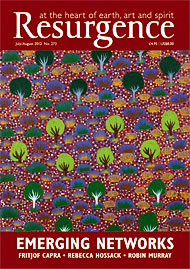Rabindranath Tagore’s vast literary output extends to 60 collections of verse, 100 short stories, several novels, plays, dance dramas, essays and over 2,500 songs, including the national anthems of India and Bangladesh. Yet his international reputation was built on his winning the Nobel Prize in 1913 for his own prose translation of Gitanjali. In this new translation, William Radice renders with beauty and precision the poetic rhythm and intensity of the Bengali originals, which appear alongside Radice’s translations, bringing the reader closer to Tagore’s own conception of the book.
Described by Tagore as “revelations of my true self to me”, there is no doubt Gitanjali is the work of a deeply spiritual man. In a letter to William Rothenstein, Tagore wrote: “I can assure you they are not literary productions at all, they are life productions.” In another letter, he described the poems as “an expression of my inmost feelings, they were my humblest prayers, my sincerest sadhana, spiritual practice and a reflection of my joys and sorrows”. The poems reflect a sense of creative rapture, emerging from a period of intense spiritual crisis and personal suffering.
Radice makes an important point in his Introduction: “A key concept in Gitanjali – and a recurrent phrase in the Bengali – is sukh-dukh, joy and sorrow, pleasure and pain… As the sequence develops more contrasting pairs are brought in – such as man and God, world and spirit, adult and child, death and life, dark and light, male and female, land and river, earth and sky, etc. As the separate poems or songs go on adding these elements, the scales can tip one way or the other… The point is that by the end of the sequence one should feel that the scales are equal.”
This poise is reflected poignantly in one poem where he uses the image of life and death as the two breasts of a mother: “If I have loved this life so very much | I’ll love Death too when I can see him clearly? | A child – for fear of losing the warm touch | Of his mother’s breast – begins to wail. But then, | Moved to her other breast, he’s calm again.” The image is simple yet powerful, personal yet universal. It is not death that consumes the poet as much as life. As we read the Gitanjali we experience the unfolding of all aspects of life and death, and by the end we reach a state of understanding, of grace.
The songs are a tribute to Tagore’s self-awareness. They include impassioned sonnets such as the famous Where the Mind is Without Fear as well as intense explorations of love, faith and Nature, the unreserved bounty of Life, Universe, God. It is God who summons up “all my songs | By giving yourself to me”. Tagore is simply the instrument of God: “I’m here merely to sing your songs.” His redemption lies in trust: “Wherever and whenever you take me | in life, in death and throughout the world | You who are familiar with everything | will make me know all.” And with surrender comes realisation: “You’ve made me limitless,” “You exhaust me, then fill me up again with new life.” This idea of completeness describes the human condition. “You save me by denying me | the many things I want…”
The ‘you’ in the poems is in the tradition of mystic poets, of Bhakti and Sufi poets; the familiarity of tone suggests intimacy, bordering on confession, prayer, yoga. It is through poetry that Tagore can best express his sense of connectedness, oneness with the Divine. Even when he says, “I haven’t yet sung the song | I’ve come here to sing,” there is a clear recognition of his vocation, the inextricable connection between life and poetry, and the realisation of our personal human limitation.
“I’ve sought you beyond my mind | In song | My whole life long. | My songs have taken me | From place to place | In time and space.” “In song after song, I’ve told such tales | About you…” Tagore writes. When someone asks, “But what do the songs you write all mean?” His answer is: “Search me!” Then he adds: “I’ve wanted often to rope you down | With words. I’ve wanted to make you my own | With songs. The golden traps I’ve set | With metres!... Elude me, steal me, it doesn’t matter. | You’re still my treasure.” In another song, he reminds us: “This song of mine has thrown away | all ornaments,” reinforcing that fact that the poems in Gitanjali are not mere literary accomplishments, but expressions of his personal-poetic vision.






